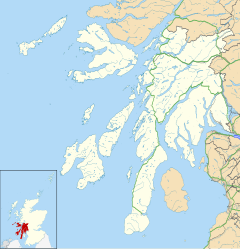Garelochhead
Garelochhead
|
|
|---|---|
| Garelochhead shown within Argyll and Bute | |
| Council area | |
| Lieutenancy area | |
| Country | Scotland |
| Sovereign state | United Kingdom |
| Post town | HELENSBURGH |
| Postcode district | G84 |
| Dialling code | 01436 |
| Police | Scottish |
| Fire | Scottish |
| Ambulance | Scottish |
| EU Parliament | Scotland |
| UK Parliament | |
| Scottish Parliament | |
| Website | https://www.garelochhead.info/ |
Garelochhead (Scots: Garelochheid,Scottish Gaelic: Ceann a' Gheàrr-loch) is a small village on the Gare Loch in Argyll and Bute, Scotland. It is the nearest village to the HMNB Clyde naval base.
Garelochhead lies at the head of the Gare Loch, 7 miles (11 km) northwest of Helensburgh. Loch Lomond is a few miles to the east, and Loch Long to the west. To some the scenic beauty of the loch is only slightly marred by the presence of the HMNB Clyde submarine base and the associated semi-permanent 'peace camp'. In addition to the few local shops, pub and church, it has a bowling club and two community buildings - the Gibson Hall and Centre 81, which is home to Route 81 youth project, gym, café, computer suite and meeting rooms.[4] There is also a gallery featuring work by Scottish artists.
Garelochhead's 1,265 residents are served by Garelochhead railway station on the West Highland Line and a local bus service running between Coulport and Helensburgh.
Garelochhead, originally in Dunbartonshire, developed from the 1820s with the advent of steamer cruising during the Glasgow Fair holiday. Tourism was boosted with the opening of the West Highland Railway line to Fort William in 1894, and in the late 20th century its prosperity was linked to the deepwater oil tanker terminal at Finnart on Loch Long and the Faslane naval base. Garelochhead Forest lies to the south.
In 1854 there was a great dispute that became known as the Battle of Garelochhead fought between the locals, led by Sir James Colquhoun, and the passengers of the steamer Ship "Emperor". The trouble started when Colquhoun did not want trippers on the sabbath day. The battle was eventually won by the passengers, but undeterred Colquhoun took his case to the courts who subsequently banned sailings on Sundays.
...
Wikipedia

